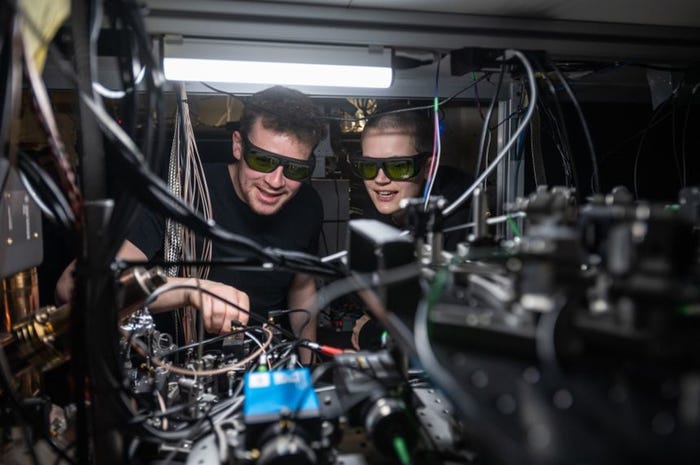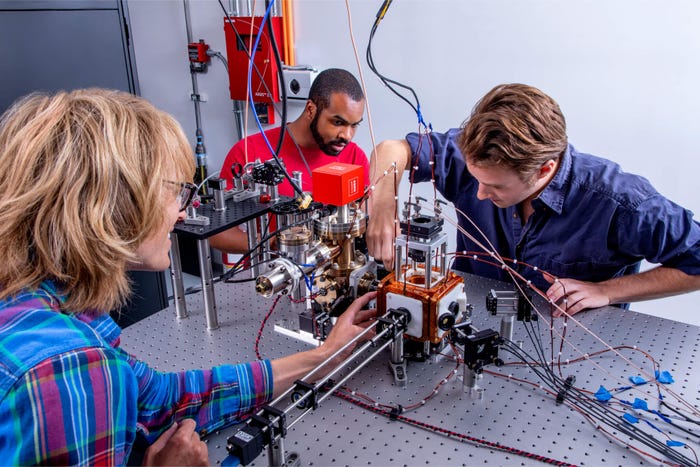
Connects decision-makers and solutions creators to what's next in quantum computing
UK Commits $129M for Quantum Research HubsUK Commits $129M for Quantum Research Hubs
Five new centers will target breakthroughs in computing, healthcare, cybersecurity and transport

The U.K. government has awarded $129 million to establish five new quantum research hubs to develop practical technology including medical scanners, secure communication networks and next-generation positioning systems.
Announcing the hubs, science secretary Peter Kyle said they will bring researchers and businesses together to develop groundbreaking quantum technologies that will directly impact people’s lives in areas like health care, security and clean energy.
“We want to see a future where cutting-edge science improves everyday lives,” he said. “That is the vision behind our investment in these new quantum technology hubs, by supporting the deployment of technology that will mean faster diagnoses for diseases, critical infrastructure safe from hostile threats and cleaner energy for us all.”
The new Labor government took office July 5 with a pledge to develop innovative technologies that can be sold domestically and exported to drive up GDP.
It anticipates quantum technologies will play a key role in the government’s stated mission to build a more efficient National Health Service (NHS) through quantum-enhanced blood tests, faster MRI scanners and new surgical interventions and treatments.
National security use cases include cybersecurity, positioning systems for GPS-deprived environments and a quantum internet to safeguard sensitive data and communications infrastructure.
The Hub for Quantum Computing via Integrated and Interconnected Implementations (QCI3) will be established at the University of Oxford, which has a long history of quantum innovation.
“The QCI3 Hub brings together industry, academia and government partners to deliver new applications, ideas and innovations that will advance the field of quantum computing, impacting areas such as materials science, chemistry, finance and logistics,” said QCI3 hub director Professor Dominic O’Brien.
“The hub will train a new generation of scientists and engineers, providing the critical skills for a U.K. quantum economy, whilst also developing the commercial skills needed for those looking to play key roles in the U.K.’s growing quantum industry. Our rich partner network will ensure that our research is grounded around real-world problems and that we are able to transfer technology out of the lab to make a meaningful impact.”
The other hubs are:
Quantum Biomedical Sensing Research Hub at University College London and University of Cambridge
Quantum Technology Hub in Sensing, Imaging and Timing at the University of Birmingham
Integrated Quantum Networks Quantum Technology Hub at Heriot-Watt University
Hub for Quantum Enabled Position, Navigation and Timing at the University of Glasgow
However, for some investors this investment is just a start.
“Government funding must flow, rather than trickle, into quantum research,” said Ekaterina Almasque, general partner at venture capital company OpenOcean.
“100 million pounds is a significant sum, but it pales in comparison to the backing and expert advice that startups need to transform research into immediate, real-world applications. For quantum startups to thrive, we must see more decentralized funding initiatives like this one across the U.K., expanding our horizons beyond the traditional tech hubs of London and the southeast.”
Commenting on the announcement, SandboxAQ president of global public sector Jen Sovada said, “We look forward to partnering with the UK government on novel quantum technologies as their ground-breaking quantum hubs are established. Technologies such as new materials and battery chemistries, quantum sensing devices for navigation and healthcare applications, as well as improved cybersecurity, will help to make the UK a global leader in quantum while providing vital lifesaving and life-changing technology to their citizens.”
About the Author
You May Also Like






